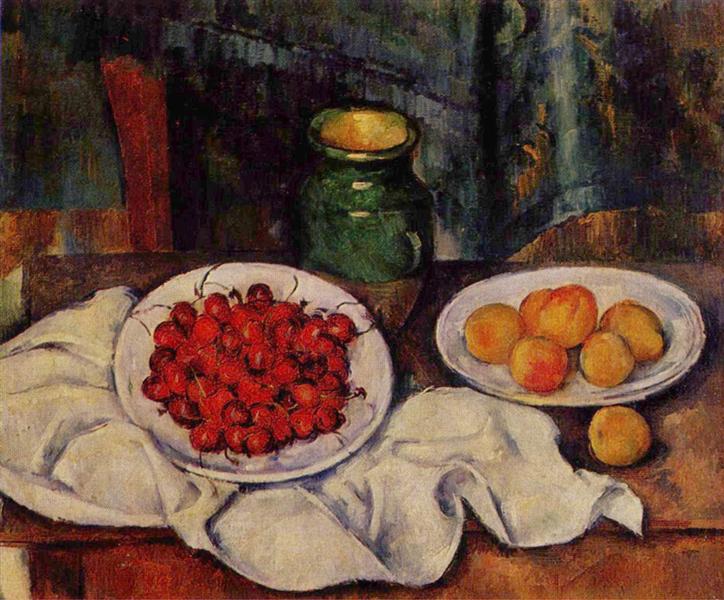Beschreibung
Paul Cézanne's painting "Still Life with a Plate of Cherries", painted in 1887, is an extraordinary representation of the post-impressionist style that characterized the work of this French master. Cézanne, who is considered a precursor of modern art, achieves in this work a balance between visual perception and the formal structure of the object, in this case, a simple but evocative set of cherries arranged on a table.
Cézanne's approach to still life goes beyond a simple representation of reality; it becomes an exploration of the relationship between colour, form and perceived reality. In this work, cherries, splendidly red and charged with vitality, are displayed on a white plate that stands out against the dark and sombre background. The choice of a neutral background colour and the arrangement of the objects create a contrast that highlights the freshness and appeal of the fruits. Cézanne uses a palette that encompasses rich reds, greens and earth tones, in which the subtleties of colour intertwine to create a sense of depth and volume.
The composition is designed with a meticulous sense of geometry characteristic of Cézanne's style. The table, while not rendered entirely realistically, suggests a firm perspective that directs the viewer's gaze toward the center of the scene, where the most vibrant elements emerge. Cézanne employs short, energetic brushstrokes that create a palpable texture, bringing each cherry and the plate itself to life. The soft shadows and color transitions are a manifestation of his interest in how light affects the visual perception of objects, contributing to an almost sculptural effect.
In terms of characters, there is evidently no depiction of human figures in this work, highlighting the idea that the study of still life can be equally powerful. Cézanne focuses on the objectivity and intrinsic meaning of material elements. Here, cherries are not just a subject; they are a means of examining the relationship between art and the physical world, a notion that would resonate deeply in the development of 20th-century art.
An interesting aspect of “Still Life with a Dish of Cherries” is how this piece fits into the evolution of Cézanne’s oeuvre. During the 1980s, the artist repeatedly explored still life themes, often using different compositions and objects. Cherries, in particular, appear in several of his works, becoming a symbol of his innovative artistic approach and his ability to transform the everyday into something sublime through art.
Cézanne knew how to capture something beyond the simple image of a plate of fruit; he managed to evoke a presence, an immediacy in the visualization of what the viewer anticipates. The work is a testament not only to Cézanne's technical mastery, but also to his ability to turn a still life into a vibrant dialogue about color, form and perception. This painting becomes a fundamental piece within his legacy and a milestone on the road to modernity in painting.
KUADROS ©, a famous painting on your wall.
Hand-made oil painting reproductions, with the quality of professional artists and the distinctive seal of KUADROS ©.
Painting reproduction service with satisfaction guarantee. If you are not completely satisfied with the replica of your painting, we will refund 100% of your money.

